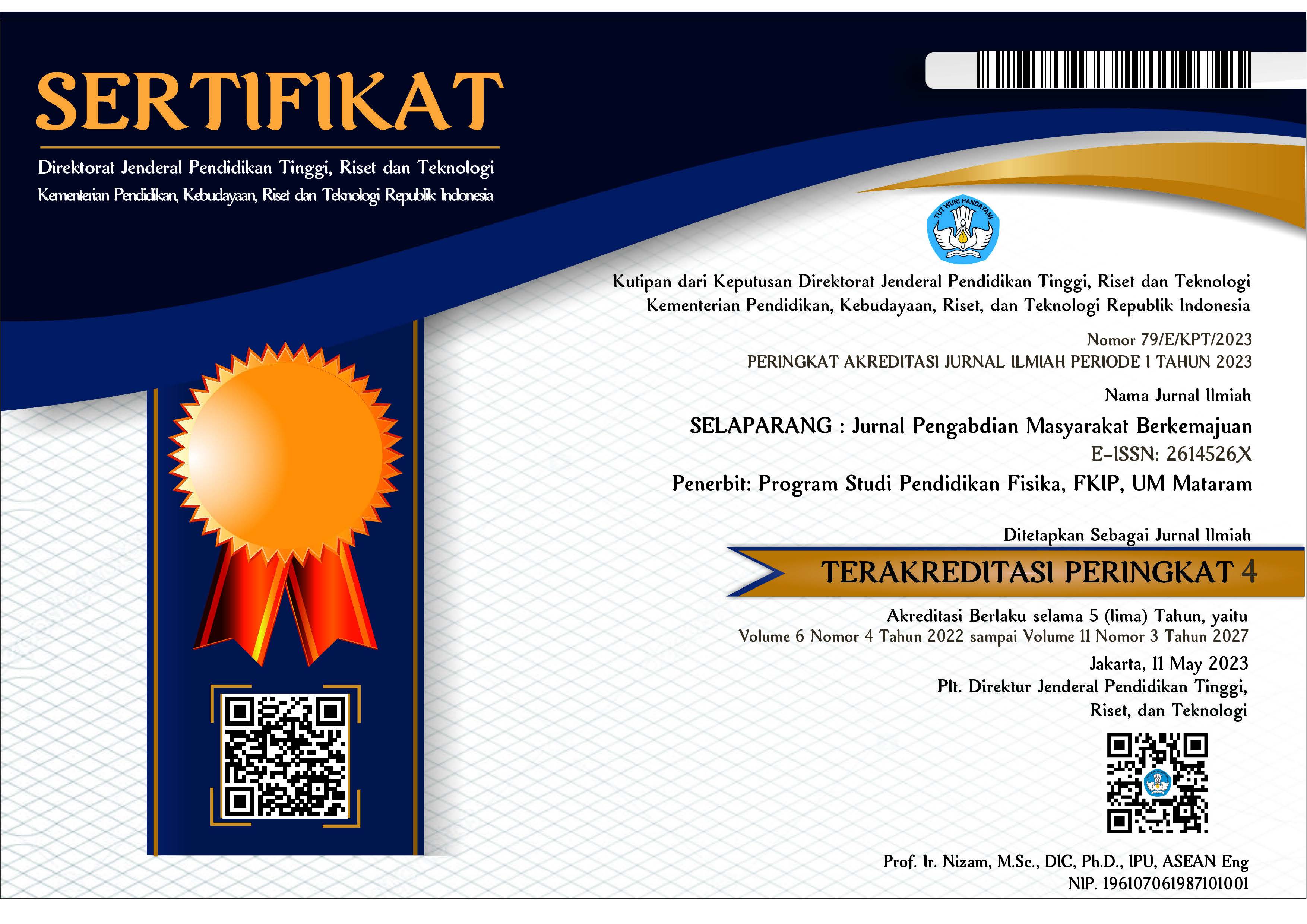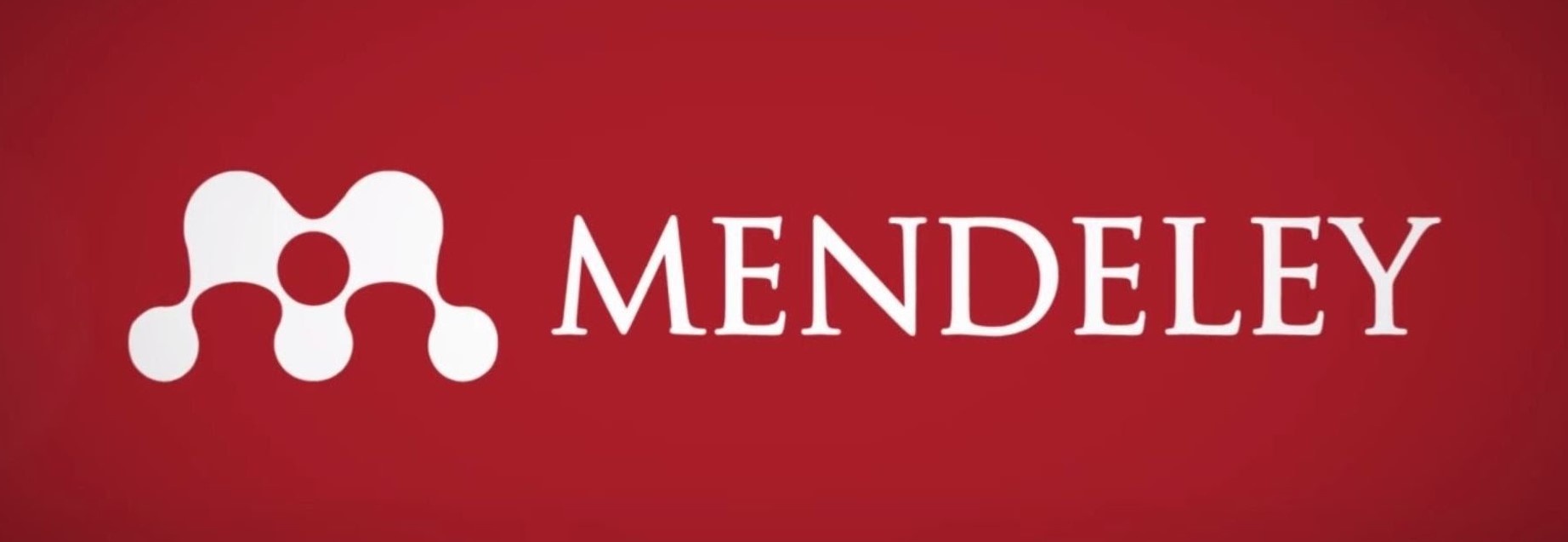PENDAMPINGAN KOLABORASI GURU DAN ORANGTUA BERBASIS EXPRIENTIAL LEARNING MENGATASI PERMASALAHAN SISWA SDN 22 MATARAM
Abstract
ABSTRAK
Pesatnya informasi dari ilmu pengetahuan dan teknologi sangat menguntungkan bagi manusia dalam menjalankan kehidupannya. Namun disisi lain juga menimbulkan permasalahan khususnya di dunia pendidikan. Permasalah tersebut juga terjadi di tingkat Sekolah Dasar. Permasalahan tersebut meliputi permasalahan akademis dan non akademis. Permasalahan non akademis tersebut terjadi di SDN 22 Mataram yaitu siswa yang malas ke sekolah, kenakalan siswa, siswa malas belajar, dll. Oleh sebab itu maka perlu adanya pengabdian kepada masyarakat yang untuk menanggulangi hal tersebut. Salah satu alternatif yang bisa dilakukan yaitu dengan bentuk kolaborasi antara guru dan orang tua berbasis experiential learning. Oleh sebab itu perlu adanya pendampingan di SDN 22 Mataram dalam melakukan kolaborasi antara guru dan orang tua berbasis experiential learning. Pengabdian ini menggunakan metode pendampingan dengan diskusi kolaborasi yang berlangsung selama tiga tahap yaitu tahap pertama penyampaian materi tentang pentingnya kolaborasi berbasis experiential learning dalam menyelesaikan permasalahan baik akademis maupun non akademis siswa. Tahap kedua yaitu diskusi terkait permasalahan akademis maupun non akademis di SDN 22 Mataram. Adapun tahap ketiga yaitu pendampingan bentuk kolaborasi antara guru dan orang dalam menyelesaikan permasalahan di SDN 22 Mataram.
Kata kunci: experiential learning; kolaborasi; masalah akademik, masalah non akademik.
ABSTRACT
The rapid information from science and technology is very beneficial for humans in carrying out their lives. But on the other hand it also raises problems, especially in the world of education. This problem also occurs at the elementary school level. These problems include academic and non-academic problems. These non-academic problems occur at SDN 22 Mataram, namely students who are lazy to go to school, student delinquency, students who are lazy to study, etc. Therefore, it is necessary to have community service to overcome this. One alternative that can be done is with a form of collaboration between teachers and parents based on experiential learning. Therefore there is a need for assistance at SDN 22 Mataram in conducting collaboration between teachers and parents based on experiential learning. This service uses the mentoring method with collaborative discussions that take place over three stages, namely the first stage conveys material about the importance of experiential learning-based collaboration in solving both academic and non-academic problems for students. The second stage was a discussion related to academic and non-academic issues at SDN 22 Mataram. The third stage is assistance in the form of collaboration between teachers and people in solving problems at SDN 22 Mataram.
Keywords: experiential learning; collaboration; academic problems; non-academic problems.
Keywords
Full Text:
PDFReferences
Awalya, A., Indriyanti, D. R., Arinata, F. S., & ... (2022). Peningkatan Kompetensi Kolaborasi Konselor Sekolah Melalui Program Pelatihan di Musyawarah Guru Bimbingan Dan Konseling (MGBK) Kabupaten Semarang. Journal of …, 2(1), 27–31. https://journal.unnes.ac.id/sju/index.php/JCE/article/view/52290%0Ahttps://journal.unnes.ac.id/sju/index.php/JCE/article/download/52290/21495
Darmiany, Karma, I. N., Husniati, & Nurmawanti, I. (2022). Pendampingan Analisis Permasalahan Non Akademik Siswa SD Sebagai Upaya Kolaborasi Guru dan Orang Tua. 4(3), 154–158. https://doi.org/10.29303/jwd.v4i3.197
Dörnyei, Z. (2019). Towards a better understanding of the l2 learning experience, the cinderella of the L2 motivational self system. Studies in Second Language Learning and Teaching, 9(1), 19–30. https://doi.org/10.14746/ssllt.2019.9.1.2
Ilyas, M., & Suryadi. (2017). Perilaku prokrastinasi akademik siswa di SMA Islam Terpadu. Jurnal An- Nida’, 41(1), 71–82.
Morris, T. H. (2020). Experiential learning–a systematic review and revision of Kolb’s model. Interactive Learning Environments, 28(8), 1064–1077. https://doi.org/10.1080/10494820.2019.1570279
Mulyani, F., & Haliza, N. (2021). Analisis Perkembangan Ilmu Pengetahuan dan Teknologi (Iptek) Dalam Pendidikan. Jurnal Pendidikan Dan Konseling (JPDK), 3(1), 101–109. https://doi.org/10.31004/jpdk.v3i1.1432
Muna, N. R. (2013a). Efektifitas Teknik Self Regulation Learning. 14(02), 57–78.
Muna, N. R. (2013b). Efektifitas Teknik Self Regulation Learning Dalam Mereduksi Tingkat Kejenuhan Belajar Siswa Di SMA Insan Cendekia Sekarkemuning Cirebon. Holistik, 14(2). https://doi.org/http://dx.doi.org/10.24235/holistik.v14i2.450
Nurohman, A., & Prasasti, S. (2019). Pentingnya Bimbingan dan Konseling di Sekolah Dasar (SD). Jurnal IImiah Konseling, 19(1), 1–14. https://bit.ly/2orir76
Oktariani, O., Munir, A., & Aziz, A. (2020). Hubungan Self Efficacy dan Dukungan Sosial Teman Sebaya Dengan Self Regulated Learning Pada Mahasiswa Universitas Potensi Utama Medan. Tabularasa: Jurnal Ilmiah Magister Psikologi, 2(1), 26–33. https://doi.org/10.31289/tabularasa.v2i1.284
Safitri, N. E. (2019). Implementasi Metode Experiential Learning Dalam Layanan Bimbingan dan Konseling Di Sekolah. JURKAM: Jurnal Konseling Andi Matappa, 2((2),), 77-84.
DOI: https://doi.org/10.31764/jpmb.v7i2.13375
Refbacks
- There are currently no refbacks.

This work is licensed under a Creative Commons Attribution-ShareAlike 4.0 International License.
______________________________________________________
Jurnal Selaparang
p-ISSN 2614-5251 || e-ISSN 2614-526X
EDITORIAL OFFICE:



















